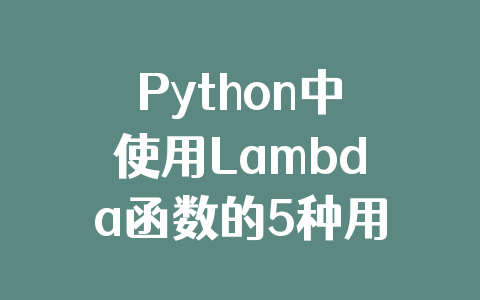一、学习如何定义一个对象
代码:
#!/usr/bin/python
# -*- coding: UTF-8 -*-
# 1. 定义Person类
class Person:
def __init__(self, name, age):
self.name = name
self.age = age
def watch_tv(self):
print(f\'{self.name} 看电视\')
# 2. 定义loop函数
# 打印 1-max 中的奇数
def test_person():
person = Person(\'Jake\', 20)
print(f\'打印person的地址:\', person)
print(f\'person.name:{person.name}\')
print(f\'person.age:{person.age}\')
person.watch_tv()
person = Person(\'Koko\', 18)
print(f\'打印person的地址:\', person)
print(f\'person.name:{person.name}\')
print(f\'person.age:{person.age}\')
person.watch_tv()
# 3. 执行calculate方法
# 计算 当前值小于1,当前值:0
# 计算 1 >= 1: True
# 计算 2 >= 1: True
# 计算 10 >= 1: True
test_person()
执行结果:

二、学习如何连接MySQL并查询
代码块:
#!/usr/bin/python
# -*- coding: UTF-8 -*-
# pip3 install pymysql
import pymysql
from getpass import getpass
# from mysql.connector import connect, Error
#
host = \'xxxxxxx\'
port = 3306
username = \'db_account_member\'
password = \'db_account_password\'
database = \'some_database\'
def connect_db():
return pymysql.connect(host=host,
port=port,
user=username,
password=password,
database=database,
charset=\'utf8\')
def print_error(e):
print(f\'错误类型:{type(e)}\')
print(f\'错误内容:{e}\')
def close_gracefully(cursor, conn):
if cursor:
cursor.close()
if conn:
conn.close()
# 查询数据库,可以写任意查询语句
def query(sql):
try:
conn = connect_db() # 创建连接
cursor = conn.cursor() # 建立游标
cursor.execute(sql) # 执行sql语句
return cursor.fetchall()
except pymysql.Error as e:
print_error(e)
finally:
close_gracefully(cursor, conn)
query_sql = \'select * from category where id = 1\'
rows = query(query_sql)
print(\'category表中的数据如下:\')
print(rows)
执行结果:

三、学习如何读写csv
代码:
# -*- coding: UTF-8 -*-
# 1. 导入csv库
import csv
file_name = \'../resources/test.csv\'
# 2. 定义headers和rows
headers = [\'index\', \'name\', \'sex\', \'height\', \'year\']
rows = [
[1, \'Jake\', \'male\', 177, 20],
[2, \'Koko\', \'female\', 165, 18],
[3, \'Mother\', \'female\', 163, 45],
[4, \'Father\', \'male\', 172, 48]
]
# 3. 定义write_csv函数
# 写入csv
def write_csv():
print(f\'文件[{file_name}]准备写入\')
with open(f\'{file_name}\', \'w\')as f:
f_csv = csv.writer(f)
f_csv.writerow(headers)
f_csv.writerows(rows)
print(f\'文件[{file_name}]写入完毕\')
# 读取csv
def read_csv():
print(f\'文件[{file_name}]准备读取\')
with open(f\'{file_name}\')as f:
f_csv = csv.reader(f)
for row in f_csv:
print(row)
print(f\'文件[{file_name}]读取完毕\')
# 4. 执行write_csv函数
write_csv()
print(\'------\')
read_csv()
执行结果:

四、读取xlsx
代码:
# -*- coding: UTF-8 -*-
# 导引
# 安装相关依赖
# pip3 install xlrd
# 引入xlrd去支持读取xls相关的文件
import xlrd
# 定义文件名
file_name = \'../resources/sku.xls\'
# 1. 读取xls文件
# 预计输出
# sku.xls该文档有 3 个tab页
sku_file = xlrd.open_workbook(file_name)
print(\"{0}该文档有 {1} 个tab页\".format(file_name, sku_file.nsheets))
print(\"每个tab页,页名分别为: {0}\".format(sku_file.sheet_names()))
# 2. 读取xls文件第1页
# 预计输出
# tab页名:Sheet1,该tab页共有59行,3列
# A6方格的值:1908165140370878
current_sheet_index = 0 # 下标0为第一页tab
current_sheet = sku_file.sheet_by_index(current_sheet_index)
print(\"tab页名:{0},该tab页共有{1}行,{2}列\".format(current_sheet.name, current_sheet.nrows, current_sheet.ncols))
print(\"A6方格的值:{0}\".format(current_sheet.cell_value(rowx=5, colx=0)))
# 3. 打印每页的数据,每一行的数据为一个数组
# 预计输出
# [text:\'1908154975415329\', text:\'鞋面是织物 鞋底是聚氨酯底的哦\', text:\'鞋底是5厘米 内增是3厘米 总高度是8厘米左右哦\']
# [text:\'1908040228021948\', text:\'鞋面是飞织 鞋底是聚氨酯底的哦\', text:\'鞋底高度是3厘米左右哦\']
# ...以下省略后续打印
for rx in range(current_sheet.nrows):
print(current_sheet.row(rx))
执行结果:

五、读写PDF
代码:
import platform
import pdfkit
# 这里根据自己的系统修改对应的wkhtmltopdf安装路径,修改其中一个就行了
win_path = \'D:/tools/wkhtmltopdf\'
non_win_path = \'/usr/local/bin/wkhtmltopdf\'
def wkhtmltopdf_path():
system = platform.system()
if system == \'Darwin\':
print(\'苹果系统,可以生成pdf\')
path = non_win_path
elif system == \'Windows\':
print(\'Windows系统,可以生成pdf\')
path = win_path
elif system == \'Linux系统\':
print(\'Linux系统,可以生成pdf\')
path = non_win_path
else:
print(\'其他系统,暂不支持生成pdf\')
raise Exception(\'其他系统,暂不支持生成pdf\')
return path
def pre_config():
return pdfkit.configuration(wkhtmltopdf=wkhtmltopdf_path())
# 从链接地址生成pdf
def generate_pdf_from_url(url, output_file_path):
config = pre_config()
pdfkit.from_url(url, output_file_path)
# 从字符串生成pdf
def generate_pdf_from_string(str, output_file_path):
config = pre_config()
pdfkit.from_string(str, output_file_path)
generate_pdf_from_url(\'https://baidu.com\', \'../temp/baidu_test.pdf\')
generate_pdf_from_string(\'hello\', \'../temp/hello.pdf\')
wkhtmltopdf这个东西一定要装,不然无法生成pdf,会报IO方面的错误,小白照做就可以,不需要理解
执行结果

生成的文件长这个样子

baidu_test.pdf

hello.pdf

以上就是python操作mysql、excel、pdf的示例的详细内容,更多关于python操作mysql、excel、pdf的资料请关注自学编程网其它相关文章!













